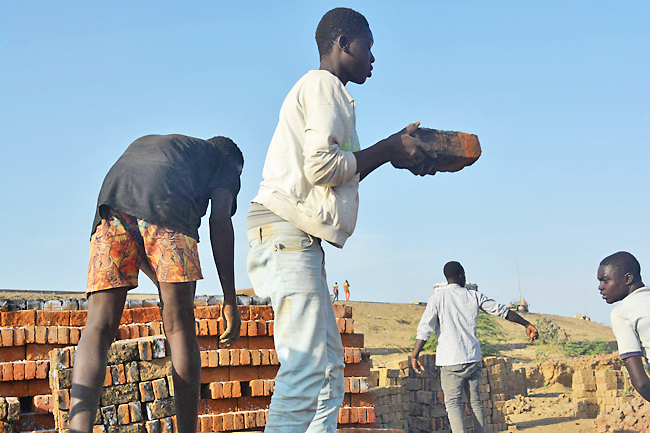N’DJAMENA (AFP) – Celestin sweats profusely in the searing heat.
Like dozens of other youngsters in Chad’s capital N’Djamena, the scrawny 13-year-old in rags is up to his knees in mud, making clay bricks.
The teenagers work on a large plot of land in the Waria district near the Chari River in the south of the city.
There are no trees to give shade. Here, in the heart of the Sahel, the Harmattan wind is just a light, dusty breeze.
Celestin, who wishes to go only by his first name, uses his feet to knead clay soil, mixed with water, straw and manure. In exhausting labour, he then fills moulds to fashion the bricks.
“I get back pain,” he said, without looking up from his task.
The lad has been making bricks for a year. For six hours of work a day, he earns around XAF2,500 (USD4.15). “But I have no choice, I have to support myself.”
Celestin works six days a week and lives in a makeshift shack in a nearby district.
A short distance away, Felix, 10, is busy moving the bricks.

He has a puny torso on rickety legs, yet each time he carries up to four bricks – a weight not far from 12 kilogrammes.
“I earn around XAF500 a day (USD0.83). I come here right after school,” he said, out of breath.
Other children, barely older and clad in rags, do the same job.
They are paid by the owner to take the bricks from the place of manufacture to the place of sale.
In recent years, the trade in clay bricks has greatly increased, with the soaring price of cement. Makeshift factories like these have sprouted up throughout the city.
Chad is, according to the United Nations, the third least developed country on the planet. The World Bank estimates that 42 per cent of a population of around 15 million lives below the poverty line.
The central African country has ratified international conventions that ban the labour of children under 14, but “due to economic hardship, many families are forced to let their children work,” said an NGO specialising in the rights of children Humanium.
In a 2018, the group described “very harsh” working conditions for youngsters in Chad, who faced long hours and low wages.
“It’s intolerable to see children working in Chad when they should be in school,” said secretary general of the Chadian Convention on Human Rights Mahamat Nour Ibedou.
“The law is there, but the government does nothing to apply it.”
With dusty clothes and a face spattered in mud, Mahamat, 16, tirelessly repeats the same gestures to mix earth, manure and straw with a shovel as he has done since he was 10 years old.
“I have sore arms all the time,” he said, speaking from a pit. “I earn around XAF500 a day, but I give everything to my mother so that she can feed us, my brothers and me.” Adults too try to survive with earnings from the clay brick business.
“I manage to make 250 (bricks) a day, which brings in a little money, even if it’s not enough to live on,” said Martin Wari, 34, who also works as a primary-school teacher for part of the day.
At 27, Emile Deaonadji is a veteran brickmaker.
He started working at the site in 2010 and today sounds fatalistic.
“Obviously it’s hard, but how do I eat if I don’t do it?”, he asked, near a brick-curing oven that gave off stifling heat and a pungent stench.


